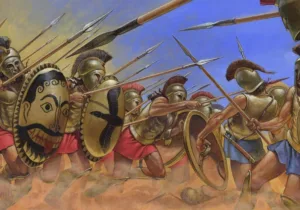In 1907, a Baptist preacher from New York City sounded the alarm on a culture war threatening both the Church and democracy in America:
Christian civilization has arrived at the great crisis of its history and is in the most urgent need of all moral power to overcome the wrongs which have throttled other nations and civilizations.
The crisis, in Walter Rauschenbusch’s view, included poor labor conditions, economic inequality, alcoholism, gambling, declining birth rates, and unsanitary living conditions. These were not isolated problems but rather symptoms of a culture war between Christianity and the mammonism of materialism and capitalism. It was therefore not enough for churches to simply preach the gospel and instill personal piety in parishioners. Christians must enlist in the fight to reverse the societal decline:
[T]he will of God revealed in Christ, human duty, and the motives of self-protection alike summon Christian men singly and collectively to put their hands to the plow and not to look back till public morality shall be at least as much Christianized as private morality now is.
The idea of a culture war was not new. In 1885, another preacher named Josiah Strong had laid a foundation for such rhetoric by describing a national culture war between Christianity and a collection of domestic perils, including Catholicism, Mormonism, socialism, intemperance, wealth, urbanization and immigration. Christians of the day broadly perceived the urban clusters of poor, imbibing Catholics from Italy, Ireland, and Germany to be a national concern. Rauschenbusch’s innovation was to argue that politics was key to a victory over these threats. His publication, Christianity and the Social Crisis, electrified the Church and provided the theological foundation for the Social Gospel movement. Political victories gradually ensued, including the income tax, tariff reductions, the Federal Trade Commission, the Food and Drug Administration, the Federal Reserve System, triumph in World War I, and women’s suffrage.
And yet, political victories came at a cost. World War I, considered at the time a “holy war” for the soul of western civilization, had a devastating impact on rank-and-file parishioners. Young men returned from the front lines disillusioned with Christianity and national reform. Church attendance and contributions plummeted, mission agencies struggled to find recruits, and Christian institutions underwent a painful split between theologically liberal modernists and theologically conservative fundamentalists. The movement ironically achieved one of its most stunning (if short lived) political victories while in its death throws: prohibition.
With the collapse of the Social Gospel movement, the American church’s influence on politics receded. Modernists, drawn from mainline denominations, played key roles in government but lacked the political heft that comes with a large, engaged base. Fundamentalists retreated to their institutional safe havens until Billy Graham led a faction back into the public square as a newly formed, evangelical movement. Moreover, a staunchly anti-communist Christianity resurged with the start of the Cold War. Yet even then, the influence of evangelicals was undermined by a lack of clear political loyalties. Like Graham, many evangelicals were registered Democrats who nonetheless voted for Republicans on occasion. Then in 1976, roughly 70 years after Walter Rauschenbusch published Christianity and the Social Crisis, a Presbyterian minister living in Switzerland came to recognize the looming culture war threatening both the Church and democracy in America:
If we as Christians do not speak out as authoritarian governments grow from within or come from outside, eventually we or our children will be the enemy of society and the state.
A domestic authoritarian government, in Francis Schaeffer’s view, was emerging from a collection of domestic perils, including recreational drug use, post-modernism, Communism, the sexual revolution, euthanasia, and abortion. These issues were not isolated problems but symptoms of a culture war between Christianity and secular humanism. The former enabled democracy; the latter inevitably produced authoritarianism. It was therefore not enough for churches to simply preach the gospel and instill personal piety in parishioners. Christians must enlist in the fight to reverse the societal decline:
Why have the Christians been so slow to understand this? There are various reasons but the central one is a defective view of Christianity. This has its roots in the Pietist movement… Pietism made a sharp division between the “spiritual” and the “material” world—giving little, or no, importance to the “material” world.
The idea of a culture war was not new. Evangelicals had long perceived the Cold War as a struggle between atheistic authoritarian Communists and God-fearing democratic capitalists. Schaffer’s innovation was to connect domestic social issues with international communism and argue that political liberals at home were marching in step with communists abroad. Thus, Schaeffer considered Rauschenbusch, as a theological liberal, to be on the side of the humanists, not God. His book How Should we then Live? and the accompanying video series electrified evangelicals and provided a theological basis for the Christian right. Political victories gradually ensued, including the election of Ronald Reagan, court appointees, and a renewed effort to fight communism that culminated with the collapse of the Soviet Union.
And yet, the political victories came at a cost. Evangelicals, as a percentage of the U.S. population, peaked in the 1990s, just as America was winning the Cold War. One explanation is that, without the specter of international communism, Christianity lost some of its domestic appeal. Another explanation is that the politicization of evangelicalism turned off those who did not share their political views. Whatever the exact cause, the percentage of “nones” (those not professing any religion) sharply grew beginning in the 1990s, and they now rank on par with Evangelicals as a religious block. Ironically, the evangelical movement achieved one of its most stunning political victories as the “nones” were eclipsing them in number: the overturning of Roe v. Wade.
While there were sharp political and theological differences between the Social Gospel and Christian right movements, their similarities are underappreciated and provide warnings about tying Christianity to a particular political platform. Mixing politics and Christianity can link their fates in unexpected ways. A shifting of the political winds can leave a politicized Christianity in the doldrums, and even political victories can produce unexpected backlashes with religious implications.
Remembering the culture wars of years past can also help put contemporary formulations in perspective. In 1855, as the Civil War loomed, an up-and-coming preacher named Lymon Abbot predicted an impending clash of cultures that would threaten both the Church and democracy in America:
American will either remain in God’s service, an exponent of individual freedom, or it will go over to Satan’s, and relapse into oligarchy and thence into monarchy.
Notions of culture wars change from generation to generation, but the perception of one is surprisingly timeless.






 Sponsor a student for Christianity & National Security 2024
Sponsor a student for Christianity & National Security 2024